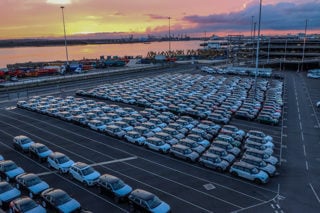Plans to help protect jobs announced by the Chancellor, Rishi Sunak, have been welcomed by the fleet and leasing industry.
Sunak told MPs in the Commons on Thursday (September 24), that the Government will continue to pay part of the wages of workers not able to return to the workplace full time due to coronavirus.
Called the Jobs Support Scheme, it replaces the furlough scheme and will pay up to three-quarters of employees’ wages for the next six months.
In order to support only “viable jobs”, the Government says that employees must be working at least 33% of their usual hours.
The level of grant will be calculated based on employee’s usual salary, capped at £697.92 per month.
Up to three million workers are currently on partial or full furlough leave, according to official figures. The current furlough scheme ends on October 31, with the new scheme starting from November 1.
The British Vehicle Rental and Leasing Association (BVRLA) says that almost two in five of its members expect to have workers still on furlough at the end of October.
BVRLA chief executive, Gerry Keaney, told Fleet News: “Businesses most affected by the pandemic need all the help they can get right now and we welcome the Chancellor’s decision to extend financial support beyond October.
“Our latest Covid survey shows that 37% of BVRLA members expect to have employees still on furlough at the end of October, so this additional support will help to stem potential job loss.”
He continued: “Our industry is resilient and continues to adapt ways of working to protect lives and livelihoods, but cash is king when it comes to survival and this additional support will provide a lifeline for many organisations that are battling to maintain a sustainable business and protect jobs.”
In addition, Sunak announced that the Government will continue its support for self-employed workers by extending the Self Employment Income Support Scheme Grant (SEISS).
An initial taxable grant will be provided to those who are currently eligible for SEISS and are continuing to actively trade but face reduced demand due to coronavirus.
The initial lump sum will cover three months’ worth of profits for the period from November to the end of January next year. This is worth 20% of average monthly profits, up to a total of £1,875.
An additional second grant, which may be adjusted to respond to changing circumstances, will be available for self-employed individuals to cover the period from February 2021 to the end of April.
Tax cuts and deferrals
As part of the package, the Government also announced it will extend the temporary 15% VAT cut for the tourism and hospitality sectors to the end of March next year.
Sunak said that up to half a million business who deferred their VAT bills will be given more breathing space through the New Payment Scheme, which gives them the option to pay back in smaller instalments.
Rather than paying a lump sum in full at the end March next year, they will be able to make 11 smaller interest-free payments during the 2021-22 financial year.
Furthermore, around 11 million self-assessment taxpayers will be able to benefit from a separate additional 12-month extension from HMRC on the ‘Time to Pay’ self-service facility, meaning payments deferred from July 2020, and those due in January 2021, will now not need to be paid until January 2022.
Bounce Back Loans
Sunak also said that the burden will be lifted on more than a million businesses who took out a Bounce Back Loan through a new Pay as You Grow flexible repayment system. This includes extending the length of the loan from six years to 10, which will cut monthly repayments by nearly half.
Interest-only periods of up to six months and payment holidays will also be available to businesses.
The Treasury also intends to give Coronavirus Business Interruption Loan Scheme (CBILS) lenders the ability to extend the length of loans from a maximum of six years to 10 years if it will help businesses to repay the loan.
In addition, the Chancellor announced he would be extending applications for the Government’s coronavirus loan schemes until the end of November.
Sunak explained: “The primary goal of our economic policy remains unchanged - to support people’s jobs.”
However, he said: "I cannot save every business; I cannot save every job."
The Finance and Leasing Association (FLA) had urged Government to not ‘prematurely end’ its Covid-19 finance support for UK business in a co-signed letter sent to the Chancellor this week.
The letter, signed by leaders from the BVRLA, Association of Alternative Business Finance, Consumer Credit Association, Credit Services Association and Innovate Finance, urged Sunak to consider carefully the option of continuing the support schemes which have provided “a lifeline to businesses across the UK”.
Speaking after the Chancellor had outlined his ‘Winter Economic Plan’, Stephen Haddrill, director general of the FLA, said: “It’s good to see that the Chancellor has accepted our recommendation to extend CBILS, and we look forward to seeing what the successor scheme for 2021 will look like. We have already proposed a revised version of the Enterprise Finance Guarantee Scheme.
“What hasn’t been addressed in today’s announcement, and what continues to be a challenge for our independent lenders, is access to funding that can then be deployed under the guarantee schemes.
“Our members are ready and willing to support SMEs, but they can’t do that without funds.”
Mike Hawes, chief executive of UK automotive trade body, the Society of Motor Manufacturers and Traders (SMMT), also welcomed the Government's announcement. He said: "The Chancellor’s Job Support Scheme is welcome and should provide temporary relief for the automotive sector, which has been so badly hit by the pandemic, as too will the flexibilities on the loan schemes and tax deferrals.
"We must make sure it’s more than just a short-term lifeline, however, and, like schemes elsewhere, ensure it supports jobs for the duration of the pandemic and recovery.
"We need every manufacturer to hold on to skilled, viable jobs, and government and business must do everything to improve competitiveness and demand.
"Business remains fragile as we head into a winter of uncertainty, and a 2021 recovery is immensely challenging and far from guaranteed.”





















Login to comment
Comments
No comments have been made yet.